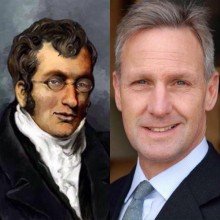I have watched the steady installation of a monument near Redcliffe View in Weymouth these past weeks. I had no clue what the monument was commemorating or memorialising as my dog walk route does not usually take me that close to the end of Bincleaves Road. However, yesterday morning with my bad timing of the tides and needing an alternative route I had cause to get up close and saw that it is a memorial to Thomas Fowell Buxton. My ignorance of local history only provoked a recognition of “oh yeah, Buxton Road”.
It has been enlightening to read something about Thomas Fowell Buxton and his moral, social and political beliefs and actions. For anyone, like me who does not know much about who this man was, amongst other things (a brewer, a Christian, a friend of the Quakers) he was the MP for Weymouth and Melcombe Regis between 1818 – 1837.
It is interesting to compare his political and social principles and achievements with those of our current MP for Weymouthand Melcombe Regis (South Dorset) Richard Grosvenor Plunkett-Ernle-Erle-Drax (to use the Family Name on his passport, rather than the media friendly one).
|
Thomas Buxton |
Richard Drax |
|
Helped raise money for underpaid workers forced into poverty by industrialisation. |
Voted against setting targets to increase the minimum wage to £8 and to halve the number of people on low pay by 2025. (Oct 2014) |
|
Financed penal reformer Elizabeth Fry for the improvement of prison conditions and campaigned relentlessly to end capital punishment (achieving a drastic reduction in the number of crimes carrying the death penalty). |
Believes in building more prisons with tougher sentences and states he is open to the arguments for capital punishment (but does not call for it). Supports indefinite detention of immigrants, welcomed Immigration Removal Centre at The Verne, Portland. |
|
Chairman of the Society for the Prevention of Cruelty to Animals (later becoming the RSPCA) during its first yearof inception in 1824. |
|
|
Founding member of the Anti-Slavery Society (known earlier as Society for the Mitigation and Gradual Abolition of Slavery). A committed abolitionist, he achieved his goal in 1833 when slavery was officially abolished in the British Empire banning the ownership of slaves. |
John Samuel Wanley Sawbridge Erle-Draxbecame MP for Wareham in 1840. In 1836 he was paid £4,293 12s 6d (appox. £3m in today’s value) in compensation for 189 slaves on his Barbados plantation. He was known as the “silent MP” for saying nothing during his 3 terms in parliament. Richard Drax is directly descended inheriting the family estate of Charborough, although Drax says he is “a very remote ancestor of ours” |
I am an eternal optimist, but one who believes in change through actions not dreams or wishful thinking. I very much hope that in the coming years Weymouth and indeed all of South Dorset will return to Parliament a representative who has the humanity of someone more like Thomas Buxton than Richard Drax. Someone whose achievements future history can celebrate.
Caz Dennett












